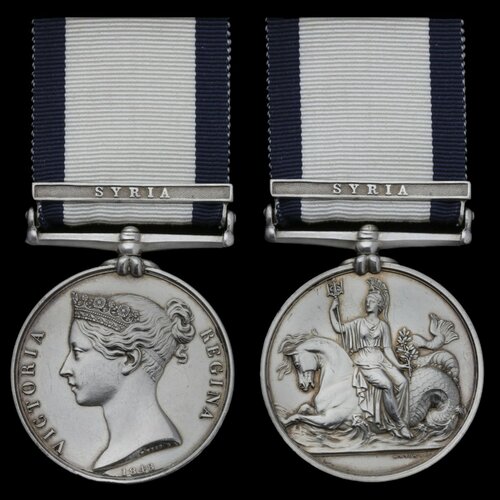
Auction: 22001 - Orders, Decorations and Medals
Lot: 3
An important Naval General Service Medal to Surgeon Superintendent J. Bower, R.N., who tended the sick aboard three Convict Ships during voyages to Australia and Tasmania
One of the ships, the Emma Eugenia, held 170 female convicts; Bower recorded the stories of these women in handwritten diaries that form a vivid chapter of Australian social history
Naval General Service 1793-1840, 1 clasp, Syria (John Bower, Asst. Surgn.), very fine
John Bower served as Assistant Surgeon aboard the frigate Castor during the Egyptian-Ottoman War of 1839-41. In 1839 Mehemet Ali, Viceroy of Egypt, alarmed European powers by invading the Ottoman province of Syria, even capturing a Turkish fleet. Castor joined a large fleet commanded by Admiral Sir Robert Stopford, which included Austrian, Prussian and Russian vessels. This fleet bombarded Acre and stormed the town on 3 November 1839. In the subsequent negotiations, Egyptian forces agreed to withdraw from Beirut. Castor also took part in the bombardment of St. Jean d'Acre on 3 November 1840 (Medal).
On 25 October 1850, Bower was appointed Surgeon Superintendent aboard Emma Eugenia, a female convict ship. His diary, held at the National Archives under the reference ADM101/25/7, gives an astonishing insight into the 170 women and 20 children from Millbank Prison who were forcibly transported to Australia aboard this ship. As Deborah Oxley has shown in her book Convict Maids, these women were typically young first offenders, often imprisoned for minor crimes. Bowers recorded the name, age, and ailments of every convict. Some of the women took babies with them. Bower noted his attempts to save the life of Elizabeth Jane Knight, eight months old:
'...yesterday, [she] cried during the night. Had three stools during the day: defecations yellow. Slept better. Food again refused. March 4th: much emaciated. March 6th: cried the whole night, is still unsettled, ate a small piece of soaked bread. March 9th: gradually becoming weaker and expired early this morning.'
The Emma Eugenia finally reached Hobart, Tasmania, on 15 March 1851. Bower's experiences aboard her led him to conclude:
'On the whole I consider the experiment tried in the Emma Eugenia proves that the separation of the prisoners on so large a scale cannot be accomplished in such vessels, and further I am of the opinion that the construction of several separate cells in which the most depraved and worst conducted women might be confined would be attended with less obstruction of the ventilation and greater practical good to the whole of the prisoners.'
Bower was then Surgeon Superintendent aboard another convict ship, this time for male convicts, called the Pyrenees. He joined her on 22 December 1852, and fulfilled his duty until she reached Western Australia on 16 May 1853. Again, he kept a detailed record of the convicts and their complaints, for which the National Archives reference is ADM101/62/7.
Voyage of the Lord Raglan
On 6 February 1858, Bower was appointed Surgeon Superintendent of the Lord Raglan, moored at Deptford. Previously a frigate, she had been hired by the British Government as a convict ship, and five days later was fitted with bars, locks, chains, and all the impedimenta of a mid-Victorian gaol. Bower's diary of this voyage is also held in the National Archives (ref. MT3211).
On 17 February, 21 wives and 29 children of convicts came aboard Lord Raglan while she was anchored off the Nore. The detachment of Royal Marines detailed to guard the convicts consisted of one Sergeant-Major, one Sergeant, two Corporals, and 26 Privates, led by Lieutenant-Colonel Graham. A further 60 convicts from Chatham Prison were taken aboard at Sheerness on 19 February. The ship's crew numbered 38 sailors, and her captain was Thomas Hybert.
Bower outlines the daily routine aboard ship: at 2.30 p.m. dinner was served to the convicts, who were then allowed to exercise on deck; at 5.30 p.m. supper was served, and at 6.30 p.m. prayers were led by Revered Frederick Lynch. Bower regularly visited the prison to check on the convicts' health. Another 65 convicts came aboard at Portsmouth on 20 February, a further 122 embarked at Portland on the 23rd, and a final 23 convicts were squeezed in at Plymouth on the 25th. On 5 March, having stowed provisions in the hold, the Lord Raglan sailed for Fremantle, a coastal town in what was then called the Swan River Colony.
Bower's diary lists the names and ages of every convict aboard Lord Raglan, even revealing their behaviour, and their progress in learning to read and write (literacy classes were organised). On 26 May he noted that a certain John Garnett was 'placed in irons as incorrigible… for flatly disobeying my orders given through one of the Constables whom he also threatened in the execution of his duty.'
Generally, Bower was respected throughout the ship. He made everyone drink lime juice regularly to ward off scurvy. His diary reveals that he had about twelve patients to deal with at any one time. When Lord Raglan arrived at Fremantle on 1 June with 268 convicts aboard, two had died during the voyage, which was actually a very good outcome and reflects highly of the efforts of Bower.
Subject to 20% VAT on Buyer’s Premium. For more information please view Terms and Conditions for Buyers.
Sold for
£2,800
Starting price
£900




